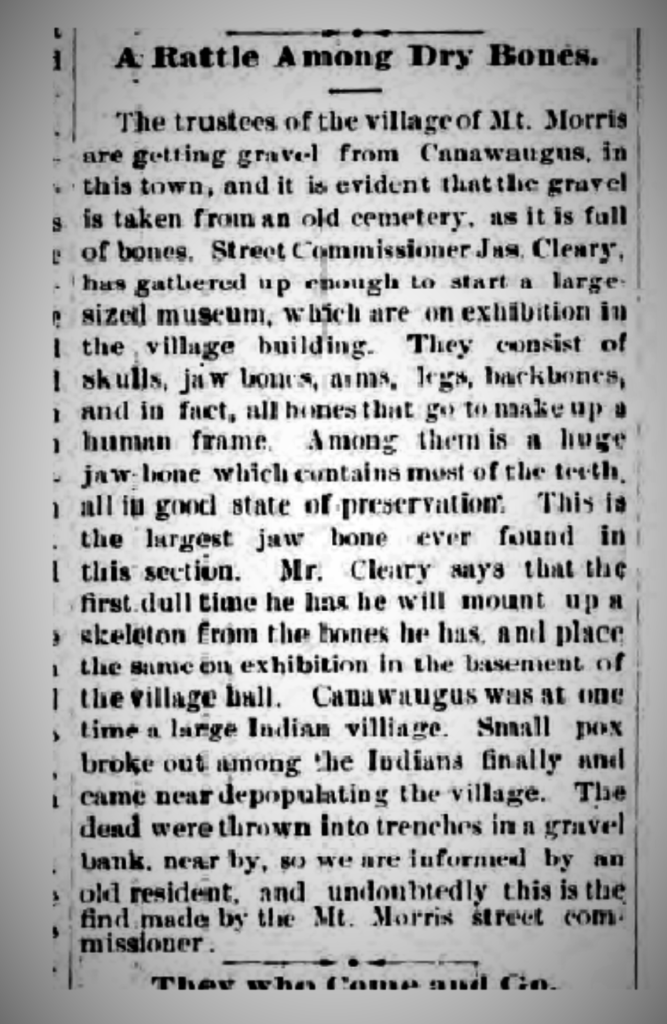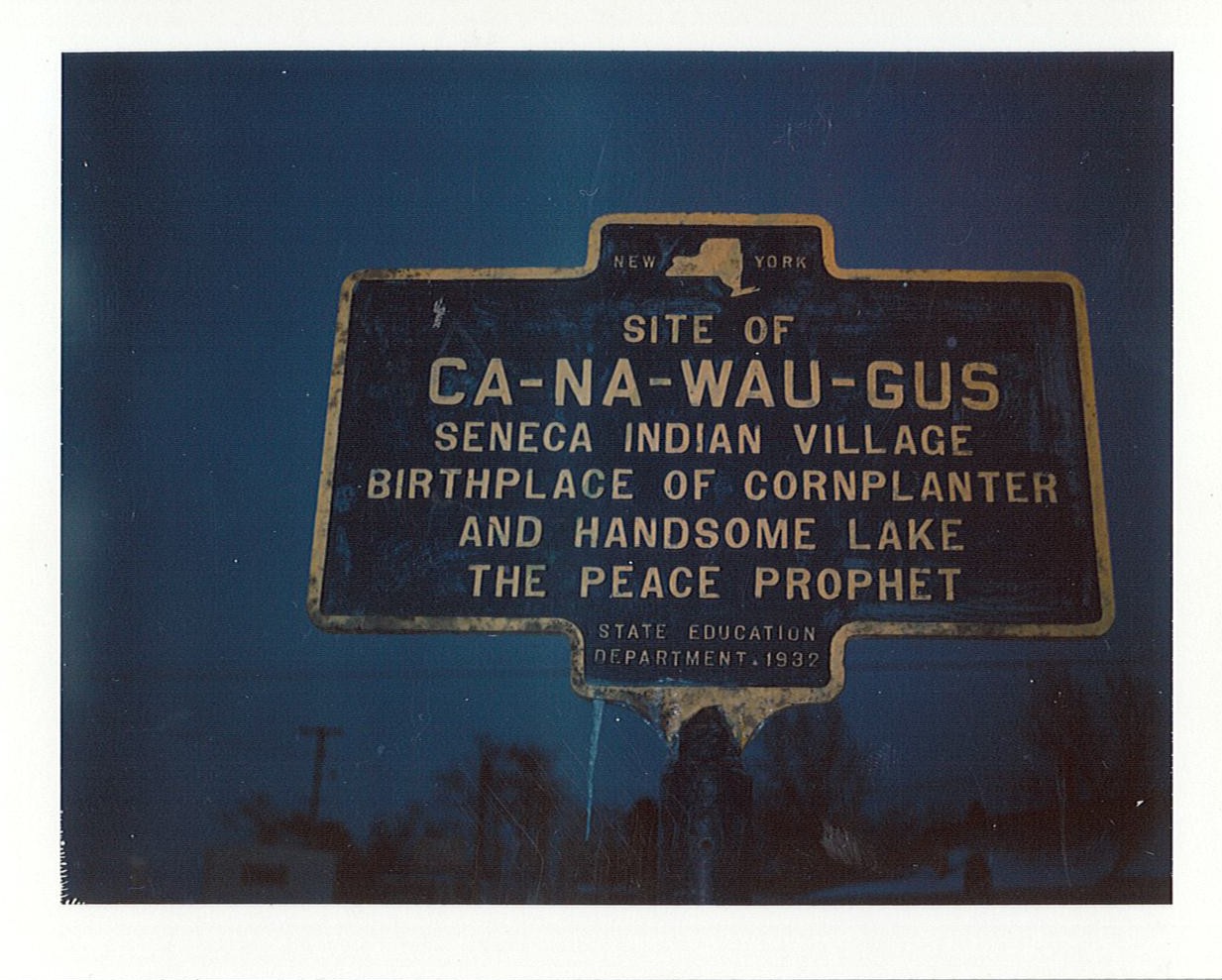Last week I attended the final public hearing regarding the Horseshoe Solar Development, a proposed solar farm that will be built on lands along the Genesee River that the Seneca Indians consider sacred. The Senecas’ story runs through the pages of Native America. A brief rally preceded the meeting, and at five in the afternoon the meeting began, overseen by an administrative law judge from the State of New York.
I have made my case on this blog as to why I think this development is a bad idea. It will almost certainly destroy archaeological and cultural source material at sites along the Genesee that the Senecas and their ancestors have used for more than two thousand years.
I spoke at the meeting, basically summarizing arguments that I included in an op-ed I published two years ago in a local Livingston County newspaper. I know my words were appreciated by the opponents of the solar development. I listened to the other speakers. Joan Scanlon favored the project. She gave a rambling talk that blew through the five-minute time limit, arguing that “we” need solar “for our children.” Absolutely nobody in the room was arguing that solar was bad. Nobody in the room supported a continued reliance on fossil fuels. Ms. Scanlon was attempting to refute an argument that nobody was making. The Senecas objected not to solar power, but to this particular development because of the damage it might do to lands they deemed sacred.
There were Senecas in the room old enough to remember when the United States constructed the Kinzua Dam over the objections of the Senecas. Before the reservoir flooded a good chunk of the Seneca Nation’s Allegany Reservation, bodies from graveyards were exhumed, and stacked like cordwood in the school yard. Senecas today remember watching this desecration of the dead from their classroom windows. It was a painful thing to experience. They see the Horseshoe project at the site of the Seneca town of Canawaugus in similar terms. Paul Winnie, from Tonawanda, saw the project as genocidal in intent, a destruction of what his people consider sacred. Melissa Smith, also from Tonawanda, was angry. “When you do this to our ancestors,” she said, “I hope it happens to you.” I noticed Ms. Scanlon smirking through five-minute talks that I found powerful and moving. Because destroying Native American graves and looting their burials is as American as apple pie, and white people’s graves are seldom destroyed in the name of progress.
Most of the speakers assumed that the state will approve the project. This hearing was not meaningful consultation, and it was not “a seat at the table.” Nor was it the “informed consent” required by the United Nations Declaration of the Rights of Indigenous Peoples. It was, the Mohawk journalist John Kane said, nothing more than “checking a box.” The corporations will get what they want. The sites at Canawaugus will be destroyed. Money always wins. The speeches, in that sense, did not matter much. Many of the opponents of the project assumed that the state had already made up its mind.
I share their views. They are probably right. I am pessimistic, I know, but I fully expect the state agency responsible for authorizing projects such as these to approve the Horseshoe solar project. The State of New York, and the corporate and business interests so incestuously connected to it, have never put the interests of Indigenous peoples first. One of the lessons of history, it seems to me, is to make sure you never get your hopes up. I hate to break it to you, kids, but I call them like I see them. Do not expect right to prevail, because quite often it does not. At least at the outset.
There are a lot of big questions we could talk about about the Horseshoe solar project. The debate over the fate of Canawaugus raises questions, seldom explored closely, about what it is that makes a site “sacred” and who gets to decide. Are all historic sites sacred? If some are and some are not, how ought that determination to be made? It is a big question, worth discussing. We can also talk about the flawed language of 19th and early 20th century anthropology and archaeology that crept into the energy company’s own reports. History, this report assumed, begins when Europeans arrive. Everything before that point is “prehistoric.” Horseshoe Solar’s experts described the sites excavated in the project area as “camps” and “seasonal sites.” Little did they seem to know that Senecas had lived and used the lands at Canawaugus for two millennia, that thousands of Senecas lived their lives, rich and full of meaning there, and that they were more than the sum of these camps and foraging sites. This was an Indigenous town, straddling the routes that moved from east to west and north to south through the Iroquois longhouse. Two of the most important leaders in Seneca history, Red Jacket and Cornplanter, were born at Canawaugus, as well as thousands of other Senecas. There they lived, and there they died. Into the twentieth century amateur pot-hunters were scooping up the remains from Seneca burials.
And then there is this even more painful question. If we cannot win, why play the game? I know. We have to protest. I understand there is a joy in mixing it up with the bad guys. But I am a historian, an employee of the State of New York. I have a book to write. I have classes to teach. I have loads of demands on my time. There is always something else I might be doing. I have never been bored. So this: I could have made the best speech in the history of the world, and I believe it probably would not matter one bit. These folks want a solar development, and they simply do not care what anyone else says.
So why do I bother? Advocating for the rights of Indigenous peoples in the State of New York is like playing tennis against an opponent who can raise and lower the net at will, widen or compress the lines while the ball is in the air. They write the rules, interpret them, and enforce them. I think about this a lot. I have been in this fight for a long time. In precisely one case involving one minor question in twenty-seven years have I been on the winning side. Indigenous peoples and their allies, in the American system, it seems are bound to lose.
I ask my students sometimes why they became interested in history. For some, it’s a simple attraction to the stories. They may have had a high school teacher who moved them with the power of his or her lessons in the classroom. This is a perfectly fine way to get into history. But for others, the stories that interest them connect to a sense that all is not well. They notice that there is a gap between the way things are and the way things ought to be, and they realize that to understand that sometimes yawning chasm requires the disciplinary skills of the historian. These students tend to me more critical in their questions, more skeptical of the stories they are told, better able to read sources with an eye towards bias, self-dealing, and veracity. We historians, after all, learn how to find the bodies. Our training teaches us where to find the receipts. We become adept at smelling rats and we will dig like badgers to find answers to the questions we began with. We act on the assumption that there always is an answer. It might take us a while to find it, and you might try to hide the answers from us. But everything we do is based on the premise that there is, somewhere, an answer and we will find it.
It is true, of course, that the Court system is built on a system of winning and losing. But historians, perhaps, never lose because the game never really ends. We did not find what we needed to find in time to help you with your case, but we can keep digging. And when we retire, die, or walk away, you can bet your bottom dollar that another historian will be bothered by the same question that bothered us, and they will pick up right where we left of. You will never get away from us. That is what I tell myself. Eventually, we will run the bastards down.
And if we never truly lose, that means you will never truly win. You might take a few rounds. Some people I know say that the “winners write history.” But the simple truth is that they don’t, not exclusively. More often than you think, history is written by those bothered by the fact that the winner cheated, or stacked the deck, or brought unfair advantages to the game. Some history is written by students who feel that the winner was a murder, a liar, or a thug. They will revise the story, and cast the winner’s deeds in a new light, one that is disorienting, unflattering, and jarring (I suspect this is why so many Republicans are in a full-blown freak-out about the teaching of history: now, perhaps more than ever, those who speak for the “losers” are calling the winners to account). Someone, someday, will expose the fallacies in these winners’ tales, or challenge their use of evidence, and question the assumptions and biases that informed their work. There may be decades where you feel your story is strong and it will stand, but the historians I know will find you.

So why do we keep at it? It is asking a bird why it flies. Asking questions about the way things are and the way things ought to be—it is what we do. So when you say that this tract of land once belonged to Indians who are no longer there, we may ask how that came to be. Why do Indians no longer own that land? And when you explain it was acquired through treaties, we will dig through those records and show that the proceedings through which the state acquired the lands at Canawaugus were rife with corruption and fraud. We will find out that the treaty was never ratified by the Senate as required under federal law. Our research will show that you are on land that was never legally acquired from the Senecas. And when you say there is nothing of significance at that site, we will show you that this is a racist lie. That white people have ample and abundant evidence of the many burials along the flats of the Genesee. They have been looting them for years. We will challenge all your assumptions. It is in our DNA. We cannot turn it off (If you are not a historian and have watched a movie on a historic topic with a historian, you know how unbearable we can be). Of course we cannot short-circuit this wiring to allow the bastards to win. But there is even more to it than that. We need to go to the records. We need to explore and explain why something bad is happening. We need to make our case. We will become experts. And know, even if we fail to persuade the unpersuadable and close-minded whose interest is in going forward with this destructive project, we will lay the groundwork for those who will follow and expose you for what you are. It would be nice to know that we can do that before the damage they do is too great.

